A New York floral and gift business takes on the iconic Harry & David brand.
A New York floral and gift business takes on the iconic Harry & David brand
A classical 1937 art deco factory building greets the eye on arrival at Harry & David, the famous Southern Oregon maker of gourmet gifts. The structure’s facade of a bygone era stands out among Medford’s modern urban landscape and is a reminder of the company’s long history in the region.
The fact that Harry & David has survived since its founding in 1934 is a testament to its enduring brand given its recent financial troubles. The former private company went bankrupt in March 2011 after racking up millions of dollars in losses during the previous two years of recession. It emerged from bankruptcy reorganization while under private equity ownership in September 2011.
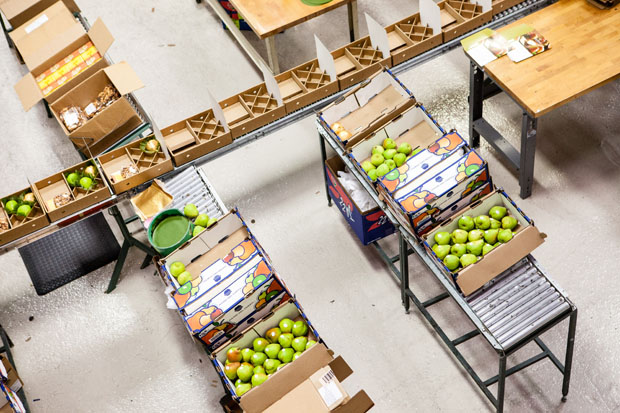
Harry & David now has a new owner, 1-800-Flowers .com, a New York-headquartered florist and gift store. The NASDAQ-traded company bought Harry & David in September 2014 for $142.5 million. The acquisition brings Harry & David into a diversified company, which maintains an umbrella of brands in the gourmet food and floral business and could give the iconic brand some stability from its financial troubles.
1-800-Flowers .com recently hired Steve Lightman, a 30-year veteran of multi-channel marketing, to be president of the Harry & David brand. Lightman was two and a half weeks into the job when Oregon Business sat down with him and David Taiclet, president of the 1-800-Flowers gourmet food group, in April to talk about their plans for the Harry & David operations.
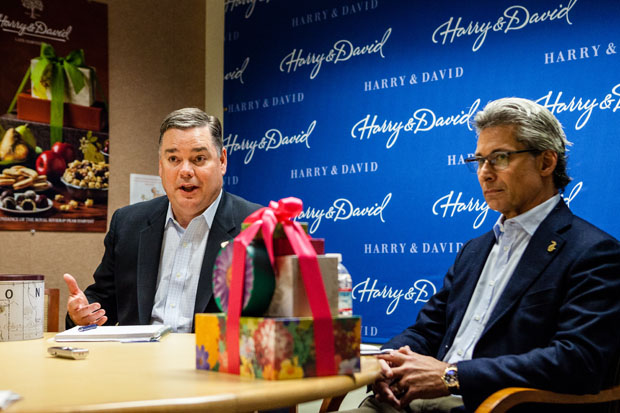
Lightman, 59, a native of Malverne in Long Island, New York, moved to Medford in March with his wife, Megan, and their Goldendoodle pet dog, Parker. A sporty type, Lightman says he is looking forward to Oregon’s outdoor lifestyle. He lists bicycle riding, hiking, skiing and taking his dog for long walks among his interests. “We really enjoy being outside enjoying stuff. It is conducive in this community to do those things.”
The new president has a long history of leading several mail-order gift catalog companies and has managed several companies through acquisitions. He started out in the mail-order business back in 1982 when he joined Arizona Mail Order, a direct mail retailer selling women’s apparel. He became president of the company when Fingerhut Companies, a telemarketing company, bought the firm in 1998.
In 2002 Lightman co-founded a group of women’s apparel and specialty food and gift catalog titles called Crosstown Traders. He sold that company, along with JP Morgan Private Equity, to Charming Shoppes, a specialty clothing company, as a publicly traded company in 2005.
Since then, Lightman has led several other multichannel marketing businesses, including the Sharper Image and the Boston Apparel Group. Most recently, he worked with private equity firms leading due diligence and company restructurings. While working in private equity, he eyed Harry & David as a possible acquisition target. “Harry & David is a company I have been looking at for years as it was up for sale,” says Lightman. “Working with private equity companies, I always thought it was a great iconic brand and a company that really has great customer following and a great associate base. At the time when 1-800-Flowers .com acquired it, I was really excited to be able to become part of the organization; to be able to be part of the culture and the community.”

The new executive says he is seeking to “enhance” the culture at Harry & David rather than introduce wholesale changes. He is open to getting feedback from employees and has an “open-door policy” for any employee who wants to share ideas for making the company better. “I like to say I manage by wandering. I like to get out into the organization. I like to sit with the people in different areas and talk with the people that are performing the function. They are the ones that can tell you most about it and what you need to do,” says Lightman.
The new management plans to keep the Harry & David name, while bringing it under the 1-800-Flowers .com family of brands. Harry & David is most famous for its Comice pears, which are still its signature product. In 1910 Samuel Rosenburg, a hotel owner, bought 240 acres of pear orchards in Southern Oregon’s Rogue River Valley. His sons, Harry and David, later took over the business and started selling the pears to hotels and restaurants in Europe. The company now owns 1,629 acres of pear orchards. The fruit is hand- picked in September and packed into gift boxes at the company’s Medford factory. The employee count swells up to 10,000 employees in September from about 2,000 in the off-season.
Harry & David has since diversified its product line to offer a range of gourmet foods for holiday celebrations. These include Moose Munch popcorn, chocolates, cakes, steaks, hams and wine. The products are manufactured at its 50-acre Medford campus. The huge vats of chocolate and conveyer belts of confectionary give the impression of being in Willy Wonka & the Chocolate Factory.
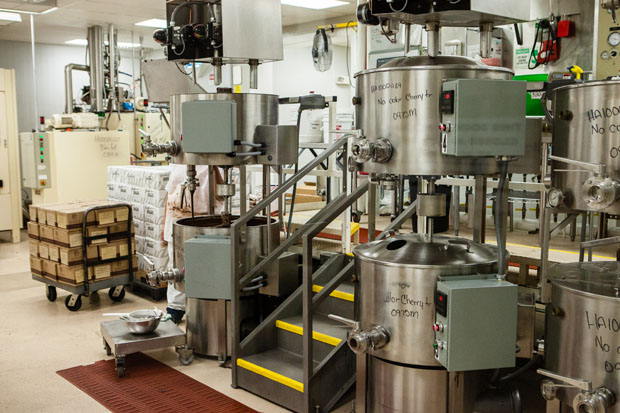
Taiclet, a former soldier in the U.S. military, who has worked for 1-800-Flowers since 2006, says the company was attracted to Lightman because of his willingness to move to Medford and get involved in the local community. Lightman was engaged in several community activities in Arizona where he was the past president of the Jewish Federation of Southern Arizona. He has served on the boards of the local community Norwest Bank of Arizona, the Jewish Community Foundation and the Jewish Federation of Southern Arizona.
“What attracted us to Steve was his personal style, his willingness to engage people face to face and verbally. It speaks well to us in understanding our responsibility in the local community and understanding how important the Harry & David brand is, in particular to the Medford community and to Oregon in general,“ says Taiclet.
Harry & David is now one of several brands owned by 1-800-Flowers .com that fit into the gourmet food category. 1-800-Flowers .com, a family-owned business, started out selling flowers out of a single New York City store in 1976. Since then it has acquired several gourmet food brands, some of which are older than Harry & David. Among these are Fannie May Confection Brands, a chocolate company; Cheryl’s, a maker of cookies and brownies; and the Popcorn Factory. Although flowers are part of its name, the gourmet food business has become the largest driver of revenue growth at the company.
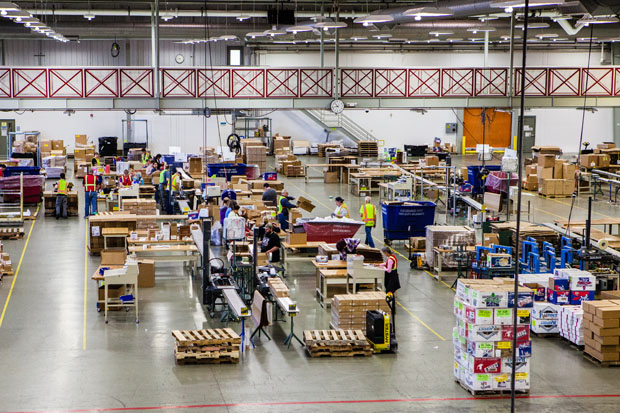
Taiclet says Lightman’s proven ability to lead several multibranded businesses is one of the reasons the company was drawn to hire him. “We wanted leadership and someone who has run a number of complicated businesses. Harry & David is a complicated business — the fact that we own our own pears and spend so much time hand-picking them.”
Observers in the Southern Oregon economy are optimistic that after changing ownership several times, Harry & David has finally found an owner that can sustain its long-term growth potential. As the largest private-sector employer in the region, the company’s future has the attention of local economic development officers. Ron Fox, executive director of Southern Oregon Regional Economic Development, says Harry & David and 1-800-Flowers .com have some “tremendous synergistic potential by being able to take advantage of the capacities each business has in their logistics, warehousing and electronic commerce.”
“We hope that this is the acquisition that sustains their long-term growth potential for the region,” says Fox.
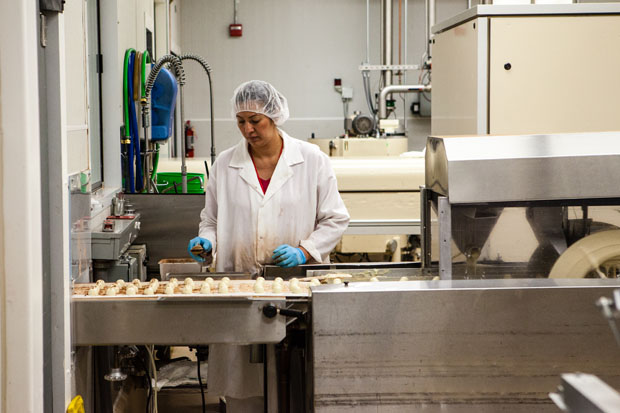
Lightman’s goal is to build on the company brand by introducing its customers to products offered by the 1-800-Flowers .com group of companies. This way Harry & David sales, which spike during the holiday season between Thanksgiving and Christmas and decline at other times of the year, can be made more consistent throughout the year. “Our goal is to find a way to service the customer all year round, for every event they are trying to celebrate,” says Lightman.
It is important for gift businesses to market to consumers throughout the year, because fewer and fewer sales are made around the Christmas holidays, says Pam Danziger, president of Unity Marketing, a boutique consulting firm. “Less retail sales are being booked in the fourth quarter,” says Danziger. “You need a gifting strategy year-round. Retailers that focus on Christmas are missing an opportunity in the gifting market.”
The ebb and flow of sales at Harry & David has created teething problems for 1-800-Flowers. The gourmet food and gift baskets division made a loss of $5.4 million in the fiscal 2015 third quarter, compared with a loss of $3.2 million in the prior year period, mostly because of the “seasonality of the Harry & David business,” according to the company’s quarterly income statement. Harry & David revenues are typically at their lowest in the first quarter.
1-800-Flowers .com predicts total revenues in 2015 to be more than $1.1 billion from the addition of the Harry & David business, an increase of $400 million before the acquisition. Taiclet expects revenues to grow at a mid-single-digit rate over 12 months.

It may prove to be an auspicious time to ramp up production in the gourmet food gift basket industry. Retail and foodservice sales of specialty-food grew 19% between 2012 and 2014, reaching a record $109 billion last year, according to a report by the Specialty Food Association. “The health of the specialty food industry reflects well on gift baskets. People are interested in specialty-food and where it comes from,” says Louise Kramer, public relations director at the association.
But being a large contender in a field of mostly small specialty food producers could prove challenging. Kramer says today’s consumers tend to prefer small specialty-food producers that focus on locally produced, organic foods. “The big corporate behemoth is definitely not favored by today’s specialty-food consumer,” says Kramer. “The consumer mind set has greatly shifted.”
Taiclet points to the investments his company is making in Harry & David’s pear orchards as proof of its long-term view for the local Harry & David brand. It is planting 50,000 pear trees on 80 acres this year, and another 70,000 trees on 100 acres next year.

This long-term view is often missing when private equity takes over a company. Wasserstein & Co. and Highfields Capital Management, both private equity firms, loaded Harry & David with debt when they bought the firm in 2004 from Yamanouchi Consumer Inc., a nutritional and personal care products company, for $252.9 million. In June 2005, the company was carrying $245 million in total debt.
“When local ownership decided to sell to a private equity group, it may have lost its long-term view,” says Taiclet. “Where a private equity group needs to get a return on capital, and looks to sell the company and return money to investors over a three- to five-year period, we are in this for the long term.”
The debt burden placed on Harry & David through private equity ownership “can be very challenging for a business,” says Fox. The 1-800-Flowers .com acquisition offers better prospects to Harry & David, he says. “I would think this acquisition does have the kind of characteristics you want to see — where the two companies together are stronger, have greater growth potential for sustained long-term success.”
It is this long-term prospect that may help to sustain the brand for another 80 years or more. Lightman echoes this view. “It is in a much better home under the 1-800-Flowers .com family and being part of a strategic organization than being part of private equity companies, where the flip is important and where capital investments are not as rich as in this organization.”
When one door closes
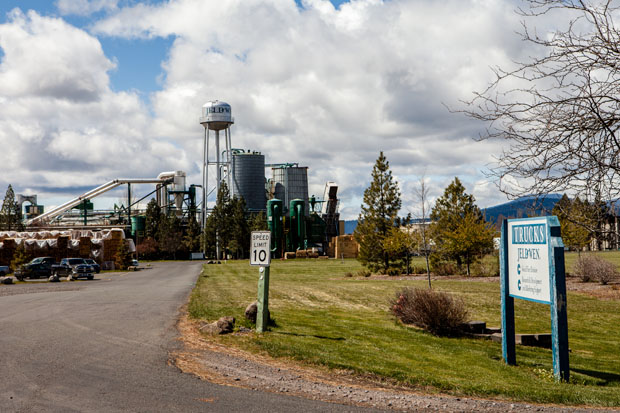
JELD-WEN and Harry & David have a lot in common. Both are iconic Oregon brands. Both were family-owned businesses acquired by private equity companies after being crushed by debt during the recession. And both companies are optimistic about finally stabilizing operations after years of upheaval.
“There’s been a lot of traumatic stress in the organization,” says JELD-WEN CEO Kirk Hachigian, who spoke with Oregon Business by phone from his office in Charlotte, North Carolina, site of the company’s global headquarters. After the housing market collapsed, the window and door manufacturer closed factories, laid off hundreds of workers and sold off satellite resort, timber and aviation interests.
As the economy rebounds and the corporate restructuring draws to a close, Hachigian says his goal has been “to rebuild business systems, build out the culture and values and invest in new products and technologies. It’s a chance to play some offense.”
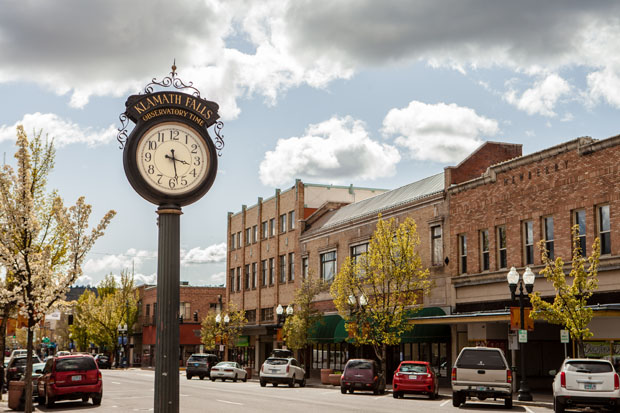
In 2011 Onex, a Toronto-based private equity firm, purchased a majority stake in JELD-WEN for $875 million. (Onex now owns 80% of the company; 20% is employee and family owned.) That investment has paid off, says Hachigian, who was appointed CEO in 2014. Revenues “are roughly where they were in 2005” — about $3.5 billion — and JELD-WEN continues to hire more workers and ship more merchandise. Innovation is also a focus, manifest in a new fiberglass door line and interior doors made from recycled wood.
JELD-WEN relocated its headquarters to Charlotte two years ago. But Oregon remains the epicenter of research and development, and most of the manufacturing still takes place in Klamath Falls, where 21% of the company’s approximately 20,000 workers worldwide are employed. (A second Oregon manufacturing facility operates in Bend.) JELD-WEN is in the process of “adding back” 20 engineers in Klamath Falls — along with six product managers in Charlotte, where the sales staff is based, Hachigian says.
During a tour of the Klamath Falls factory, business certainly appeared to be humming. High-tech precision cutting machines and a quality control lab convey a state-of-the-art feel. There are machines that open and close doors thousands of times; others spray windows continuously with water. One contraption propels an object at high speed against a glass door or window to make sure the glass doesn’t completely shatter. JELD-WEN’s corporate culture has not changed significantly since the relocation, says Randy Cox, the company’s Klamath Falls-based vice president of research and development. The leadership “is very engaged in day-to-day operations,” he says. Cox, who has worked at the company for 31 years, spends one week a month in Charlotte, the rest of the time in Klamath Falls.

Community leaders expressed mixed feelings about JELD-WEN’s restructuring. Three of JELD-WEN’s board members (including John Carter, chair of Schnitzer Steel, and Steve Wynne, executive vice president of Moda Health) are from Oregon, and the company continues to hold shareholder meetings in the state. JELD-WEN also employs more local workers than before the Onex investment.
Nevertheless, the shuttering of the global headquarters did impact the company’s community participation, says Charles Massie, executive director of the Klamath County chamber of commerce. “The executive team and white-collar workers and management invested a lot in organizations,” Massie says. “They helped propel education in the community. When there are large-scale changes, you lose access to that. There was a knowledge and support resource that was lost.”
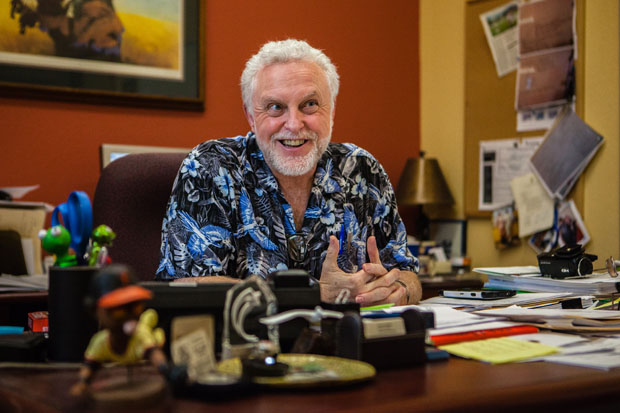
Changes taking place in Klamath Falls help compensate for that loss, Massie acknowledges. As the timber economy has declined, the region has started to diversify with a growing health care sector and a business incubator connected to the Oregon Institute of Technology. People forget the history of JELD-WEN is “five to six guys that started a business,” Massie says. “I like to hold them up as a good example of innovation.”
Will JELD-WEN, like Harry & David, eventually sell to a strategic buyer? “There is no way to know,” says Hachigian, who is focused on the present. “Take a family business run as a collective of businesses, drive them through the worst economic cycle in the country’s history and lose the founder. People were shell-shocked. We’re pulling the organization together.”
Where they are now
In January longtime business and civic leader Ron Saxton left his position as executive vice president of JELD-WEN to join Schwabe, Williamson & Wyatt’s Portland office as a shareholder. The former (2006) gubernatorial candidate is working with technology, agriculture and food processing startups, helping founders raise capital and assemble boards of directors. Getting a company “up and running” is enormously satisfying, Saxton says. But he expressed nostalgia for JELD-WEN, where he also served as chief administrative officer. “I was traveling too much. But I absolutely loved my job and loved a lot of people there.”



